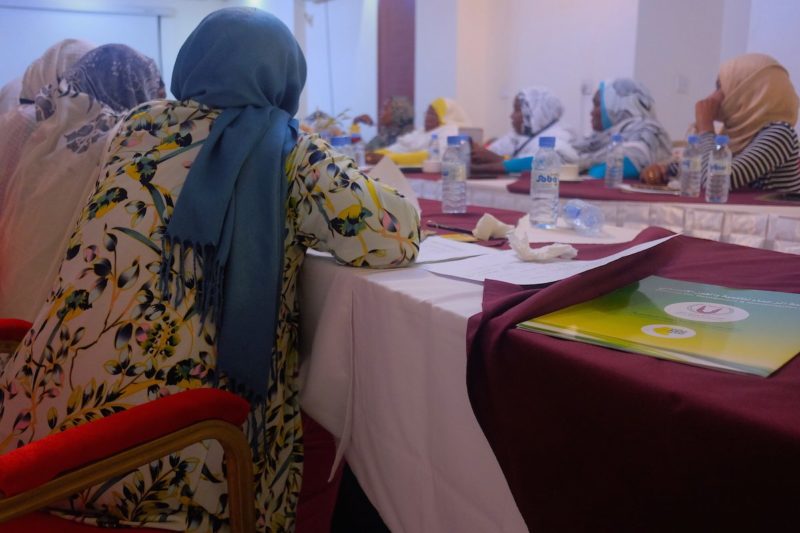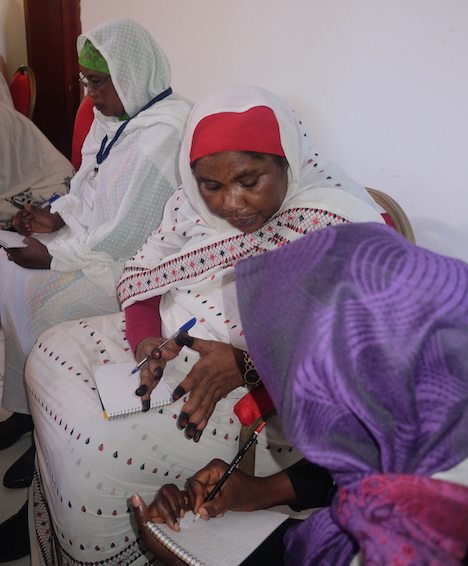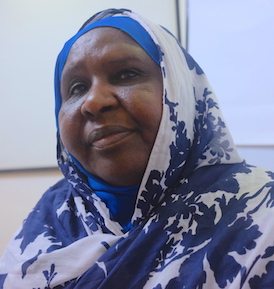The Peacemakers of Darfur: ‘We Are Your Aunties, and We Are Coming for Mediation’
Over the past three years, funded by a modest grant from the Dutch government, 16 women and the local organizations they run in Sudan have intervened in dozens of disputes and brokered solutions. In some cases, that meant building a freshwater well—in others, assistance in drafting laws and power-sharing agreements.

The chatter of 16 women rang through a typical hotel conference room, almost drowning out Mekka Abdelgabar’s call to end the ongoing exercise. For the past hour, using a speed-dating setup, the women have been swapping partners in order to share advice on their critical work.
Covered head-to-foot in patterned tiab, each woman hails from a different region in Darfur, the war-torn region in western Sudan that’s been the focus of international—and celebrity—attention for more than a decade. Both Sudan’s government and its critics have in the past distorted the narrative of the crisis that’s resulted in millions of deaths and displacements since 2003, when fighting between government forces and rebel groups began. But these women are more concerned with action than message.
They’ve traveled to Sudan’s capital city of Khartoum to learn from each other tactics for intervening in daily intertribal conflicts that, left unchecked, can easily escalate to violence. These self-appointed peacemakers have taken on public roles in a very traditional, male-dominated culture.
In a resolution adopted in 2000, the United Nations Security Council declared that women and children are most affected by armed conflict, and stressed the importance of women’s participation in peace building and reconciliation. But in a survey conducted a decade later, the UN concluded there’s been “little success,” and that women made up less than 10 percent of those involved in formal peace negotiations.
In Sudan, talks between the national government and opposition groups collapsed for the 12th time in August. And local authorities and tribal leaders often fail to settle disputes that cause additional chaos and suffering in the war-torn region, said Abdelgabar, who started the Women Alliance for Peace (WAP) in Darfur project three years ago.
She knew of other women’s movements in Africa that were significant in establishing peace after brutal civil wars. After the 1994 Rwandan genocide, women—who were 70 percent of the country’s remaining population—were incorporated into every level of government. In Liberia in 2003, women staged collective prayers and mass sit-ins to force politicians to negotiate a resolution.
Having worked on peace initiatives in Darfur for the previous ten years, Abdelgabar had a vision: women from different tribes and organizations trained in conflict resolution, connected and sharing ideas. Such a network could create the kind of sustainable platform that international organizations—and politicians—had repeatedly failed to secure.

The network would approach conflict resolution from the bottom up, not with peace agreements between politicians, but through mediation with aggrieved parties. Often that means creating space where groups and individuals can voice grievances and, it soon became clear, grief. This happens both during mediation and at the workshops.
“The participants were given the chance to discuss and argue and during the event the sadness, the sorrow and the grievances of the women became very obvious,” according to a WAP-Darfur report from one early workshop.
With thousands dead and millions displaced since 2003, many of the women are in a permanent state of mourning, so the workshops begin with condolences.
Theories from peace and conflict studies have posited that a grieving process must take place before opposing parties are ready to negotiate, whether on the individual level or the collective level. Because of this, mediators often meet with each side separately before bringing them together.
“Each group is defending themselves, so you don’t know who started it,” Abdelgabar told Rewire. “We tell them: ‘You have to give up some things. You can’t have it all; you can’t have any red lines. What compromises are there?’”
Most problems in Darfur come from land and resource disputes, made worse by the refugee crisis and desertification from climate change. But clashes can also grow out of personal disagreements that would regularly be addressed by legal mechanisms like courts—which may be ineffective or nonexistent in remote areas.
“People come to the police station, but [the police] won’t do anything. Some draw benefit from one side or the other, and so do some politicians,” said Abdelgabar, citing “very deep tribalism.”
The mediators look for common ground—economic interdependence, for example—as incentive to find resolution quickly. They also create opportunities for women to bond through organized activities, developing interpersonal relationships between different tribes.
Over the past three years, funded by a modest grant from the Dutch government, the 16 women and the local organizations they run have intervened in dozens of disputes and brokered solutions. In some cases, that meant building a freshwater well—in others, assistance in drafting laws and power-sharing agreements.
But first they had to break down entrenched cultural norms.
Men dominate the political space in Sudan’s deeply patriarchal society, with elders taking on the role of decision makers. Abdelgabar, who grew up in Darfur and then lived in Europe before returning, expected resistance to the concept of mediation, especially when brokered by women.
The network appealed to women directly, organizing workshops and trainings, but also gaining the attention of local administrations. Curious, or perhaps suspicious, the men insisted on attending.
“We ended up with more men than women,” Abdelgabar said.
The mediators highlighted the impact of war on women and children and appealed on the basis of religion and fundamental values, careful not to challenge the status quo directly. Instead, they called for a “renewal of tradition,” the WAP-Darfur report stated.
Eventually many local officials and warlords embraced the mediation methodology, marking an important shift in women’s contribution in Sudan’s political sphere. They’ve also asked for more mediators to be trained, according to the organization. The women are currently trying to find alternative funding to replace the expired grant from the Dutch government.

Women can have a significant impact because they “talk from their heart, and everyone listens to them because of a respect for motherhood,” Abdelgabar has said, mirroring the traditional perspective of her homeland.
But women can also be a fundamental part of the war effort. The hakkamat, Sudan’s traditional female singers and poets, are war agitators, enticing their tribesmen to battle. That practice of provocation continues today despite ongoing appeals from activists to change the custom.
Going forward, WAP-Darfur is proposing a more aggressive approach than appealing to the hakkamat’s goodwill. Those who choose to sing about peace instead of war will be rewarded with public praise and, perhaps, opportunities to perform abroad. Those that continue to promote war through song and poetry will be subjected to “something like shaming and blaming through the media,” said Abdelgabar.
In fact, she’s turned to media before, using a popular radio station to prevent an impending battle and force the warring parties to the negotiating table.
Word spread in Nyala, the capital of South Darfur, that a conflict was escalating between two tribes, and that both sides were mobilizing fighters. The ragtag armies would march from their respective strongholds and fight when they met in the middle. Abdelgabar, who was conducting a learning event in the city, knew that one of the tribes involved was her own.
Wasting no time, the 60-year-old sprang to action, contacting the local radio station and asking for airtime. This is how most people in Darfur get their information, so the radio would provide the fastest and farthest reach. Abdelgabar was given half an hour to make her case live on-air.
“Ask yourselves: Why are you killing each other?” she pleaded directly with the would-be fighters, she recalled to Rewire. “The people asking you to fight, their children aren’t fighting, they’re studying, why?’
Using her experience of living in the Netherlands, Abdelgabar told the fighters that boys their age are in school in Europe, a continent that was once ravaged by war but has now formed a political and economic union.
Finally, she said she pled with them: “We are your aunties, and we are coming for mediation. Please wait for us; please don’t fight.”
The young men, who called into the radio program, agreed to hold off. In the following days, WAP-Darfur met with each group separately, then brought them together and eventually brokered a peace agreement.
At the learning event in the Khartoum conference room, the 16 women, took turns recounting tales of local troubles and explaining how they intervened, with Abdelgabar moderating.
The following day the nascent peacemakers would travel back to their communities in Darfur, resuming their duties of preventing the next potential crisis.
Over the last few months, Trump’s advisers have hinted at an increase in security cooperation with Sudan, according to officials in Khartoum, and it’s not yet clear how this shift might affect domestic conflicts. The women’s role in promoting stability in Darfur could gain a new level of importance.
Reporting from Sudan was made possible by the Pulitzer Center.
